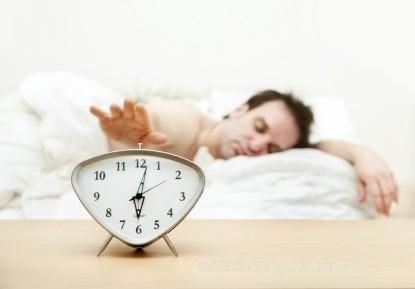
睡眠不足会大幅降低男性体内的睾丸酮水平
【导读】缺乏睡眠会对男性的身体产生多种不利影响,其中的原因是睡眠不足会大幅降低男性体内的睾丸酮水平。
美国医学会1日发表研究报告称,缺乏睡眠会对男性的身体产生多种不利影响,其中的原因是睡眠不足会大幅降低男性体内的睾丸酮水平。
研究人员首先选择10名平均年龄为24岁的健康男性作为研究对象,然后将他们安排在实验室里睡觉。
睡眠分两个阶段进行:第一阶段为3个晚上,调查对象的睡眠时间为每晚3小时;第二阶段为8个晚上,调查对象每晚睡眠时间不到5小时。研究人员会定时抽取调查对象的血液,进行检测。
结果发现,在持续缺乏睡眠一周后,被调查对象的睾丸酮水平明显下降,而且他们普遍出现情绪变坏、做事无精打采、体力欠佳、注意力不易集中等现象。
研究人员说,男性睾丸酮水平会随着年龄增长而减少。一般来说,成年男性年龄每增长一岁,睾丸酮水平会减少1%至2%。此次的研究表明,如果长期缺乏睡眠,男性血液中睾丸酮的下降速度会加快。
Cutting back on sleep drastically reduces a healthy young man's testosterone levels, according to a study published in the June 1 issue of the Journal of the American Medical Association (JAMA).
Eve Van Cauter, PhD, professor in medicine and director of the study, found that men who slept less than five hours a night for one week in a laboratory had significantly lower levels of testosterone than when they had a full night's sleep. Low testosterone has a host of negative consequences for young men, and not just in sexual behavior and reproduction. It is critical in building strength and muscle mass, and bone density.
"Low testosterone levels are associated with reduced well being and vigor, which may also occur as a consequence of sleep loss" said Van Cauter.
At least 15% of the adult working population in the US gets less than 5 hours of sleep a night, and suffers many adverse health effects because of it. This study found that skipping sleep reduces a young man's testosterone levels by the same amount as aging 10 to 15 years.
"As research progresses, low sleep duration and poor sleep quality are increasingly recognized as endocrine disruptors," Van Cauter said.
The ten young men in the study were recruited from around the University of Chicago campus. They passed a rigorous battery of tests to screen for endocrine or psychiatric disorders and sleep problems. They were an average of 24 years old, lean and in good health.
For the study, they spent three nights in the laboratory sleeping for up to ten hours, and then eight nights sleeping less than five hours. Their blood was sampled every 15 to 30 minutes for 24 hours during the last day of the ten-hour sleep phase and the last day of the five-hour sleep phase.
The effects of sleep loss on testosterone levels were apparent after just one week of short sleep. Five hours of sleep decreased their testosterone levels by 10% to 15%. The young men had the lowest testosterone levels in the afternoons on their sleep restricted days, between 2 pm and 10 pm.
The young men also self-reported their mood and vigor levels throughout the study. They reported a decline in their sense of well-being as their blood testosterone levels declined. Their mood and vigor fell more every day as the sleep restriction part of the study progressed.
Testosterone levels in men decline by 1% to 2% a year as they age. Testosterone deficiency is associated with low energy, reduced libido, poor concentration, and fatigue.
The National Heart, Lung, and Blood Institute funded this study. Additional funding came from the National Institute of Diabetes and Digestive and Kidney Diseases, and the National Institutes of Health. Rachel Leproult, PhD, organized and supervised the experiment which took place in the University of Chicago Clinical Research Center.







